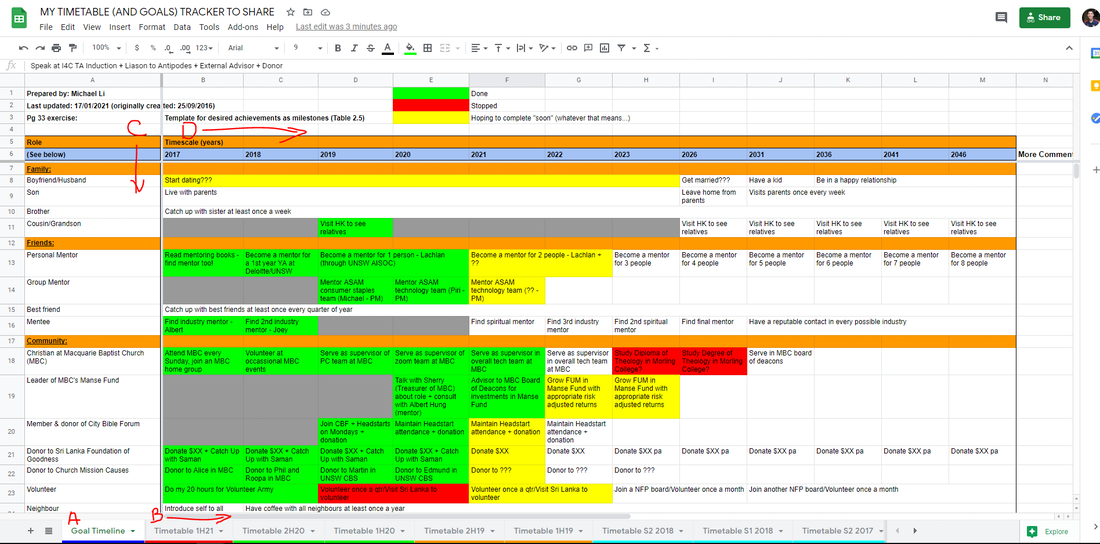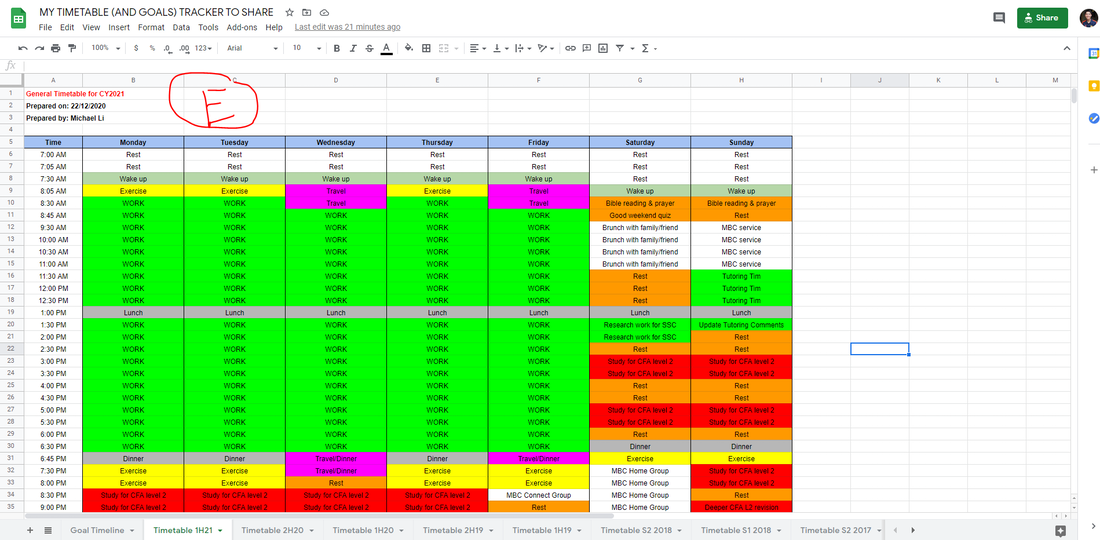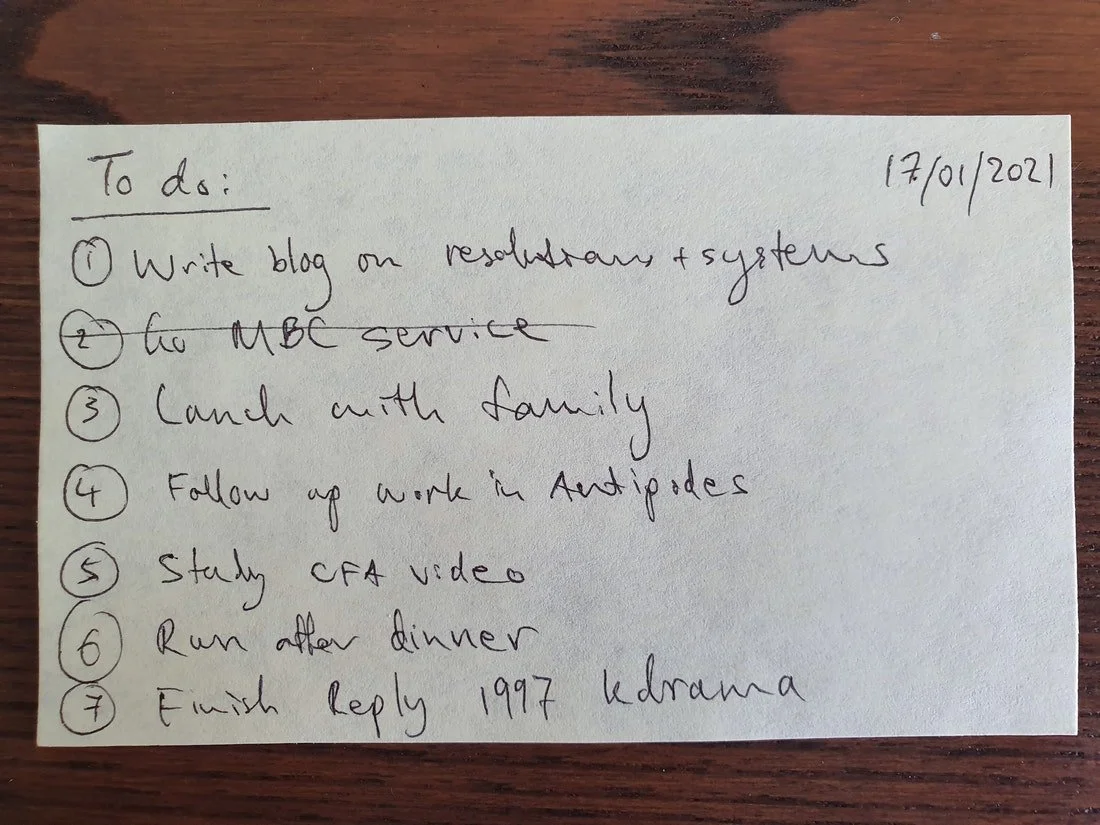Using goals + systems to approach 2021
My evolving thoughts on how I interpret "resolutions" and "systems"
Every time we begin a new year, a decent portion of people will have new year resolutions (i.e. basically goals). It's like a "restart" for a lot of people, and certainly, it would be nice to "restart" and say goodbye to the wild year that was 2020.
With resolutions, I have gone through a complicated journey with how I approach them. I used to not believe in resolutions at all, believing it was ridiculous to "force" having them at the start of the year every time. I then started believing instead to focus on systems (i.e. the micro routines and tasks you do day to day), but realised you can do that but very quickly get lost in the "trees" and forget about the "forest". So I have now come full circle, back to resolutions, but in a different light.
I describe it as a more yin and yang approach now. I consider resolutions and systems both equally important, being consciously aware of simultaneously always having one foot in the resolutions and the other foot in the systems. That is a delicate balance.
I think the prevailing wisdom, is that most people tend to focus on setting specific, actionable goals. Each one is treated as simply a goal to be reached. I used to do this too. Whether that was getting into a specific school, attaining a certain HSC mark, securing a decent WAM, reading the Bible more, breaking into the hedge fund industry, picking a number of stocks to generate a return, meeting my soulmate, etc... I succeed in some, but fail in others. It was really only 2016 onwards, when I began to realise that my results had relatively less to do with the resolutions I set and relatively more to do with the systems I followed.
Three examples to distinguish the difference, courtesy of "Atomic Habits" author, James Clear:
If you’re a coach, your goal might be to win a championship. Your system is the way you recruit players, manage your assistant coaches, and conduct practice.
If you’re an entrepreneur, your goal might be to build a million-dollar business. Your system is how you test product ideas, hire employees, and run marketing campaigns.
If you’re a musician, your goal might be to play a new piece. Your system is how often you practice, how you break down and tackle difficult measures, and your method for receiving feedback from your instructor.
Where I believe I differ from James Clear is that he emphasises more on systems > goals, but I like to ideally think of systems = goals.
He points out 4 very real problems when spending too much time thinking about goals, and not enough time designing systems that I'll recall below to set the scene for where he's coming from, and I generally agree with them but think a lot of these statements depend on the individual's personality (and James makes it clear that none of this is to say that goals are useless altogether)...
Problem #1: Winners and losers have the same goals.
Problem #2: Achieving a goal is only a momentary change.
Problem #3: Goals restrict your happiness.
Problem #4: Goals are at odds with long-term progress.
As an investor, investing in the stock markets for the last ~5 years now, I've had more time to appreciate the idea of realities and expectations. Similarly, the way I think about goals and systems is that goals help set expectations for me, whilst systems build my reality closer to those expectations I've set.
A breakdown of my tracker I've used the last 5 years that marries "resolutions and "systems"...
So getting back to the title of my blog post... How do I marry "resolutions" and "systems"? I welcome you all to my "timetable (and goals) tracker". I call this my trusty toolkit I have used for the last ~5 years. Whilst not perfect, it has allowed me to take on more responsibilities over time whilst still making meaningful impact in my eyes. It has probably been the most useful tool in helping me focus on both resolutions and systems.
See my personal tracker here as an example.
Note, I have removed some of the roles and placed "XX" in areas where there are numbers for privacy reasons only. However, I would like to use this spreadsheet for its illustrative purposes in my blog. See my labels, A, B, C, D, and E below.
I'll now proceed to attempting to describe how I marry the "resolutions" and "systems" in the above framework.
A: "Goal Timeline" tab is basically an X-Y "resolution" table, where Y-axis are the different categories of roles I see for myself in life, and X-axis are the different milestones I hope to achieve in each of the roles I live. This was inspired by "How to Make Partner and Still Have a Life" by Heather Townsend and Jo Larbie. This was a book I read in 2016 that gave me the starting framework that you see in the picture above. Very thankful I read this despite not ending up continuing as an auditor in Deloitte. I never would have stumbled on this book if not for even entertaining the crazily ambitious idea that maybe I would become a partner some day at a Big 4 firm originally... I have a colour coding system using simply traffic light colours. Generally over time, I've had more greens than reds which is absolutely speaking, positive. However, I am conscious this is relative to my own expectations only.
B: "Timetable (XXXX)" tab is where I refresh every half year, to update the micro "system" level of my days. Back in my first timetable in 2H2016, I designed it in such a way that it was 1 hour blocks. I've noticed the more recent timetables like 1H2020 onwards forced me to consider 30 mins and 15 mins blocks, as time became a more and more limited resource for me, and my duties and responsibilities increased quite dramatically. It has forced me to adapt my timetables. I have generally followed these timetables. Although not necessarily the chronological order, in my mind the timetable reminds me the tasks I just need to get done in the day (the time in which I get it done matters less actually).
C: I have listed some different roles in my life in the picture above, going down the column. If you see my spreadsheet, you'll notice I "red highlighted" the "Food Reviewer" role and "Mandarin Speaker" role. I used to have ambitions to hit milestones in these 2 roles, but over time, I have had to prioritise and honestly evaluate what are the most important roles to me within the constraints of time and my skills. This tracker has helped me to prioritise on the roles that matter to me. This has likely saved me hours of time, that I can then allocate to somewhere else more meaningfully important to me, like my "work" areas just as an example. Some may ask how I prioritise the roles in my life when I come at a fork in the road, and generally speaking, the tldr answer is prayer (which I mention again at the end of the blog, but hope to deep dive into on another blog post). The somewhat longer answer is it comes down to allocating my "skill" resources, to the most optimal roles where I can see sustainable long term "milestones" being hit, i.e. the trajectory path is visible within my current skillset. Every role to me is seen as an investment, and I allocate my human "skill" capital accordingly with the highest "skill adjusted returns" if that makes sense...
D: I have listed some different milestones per role in my life in the picture above, going to the right of the rows. This tracker can also help me assess whether there are milestones I have hit, missed, or planning to hit soon based on my above traffic light colour scheme. This is useful as a backward looking and forward looking tool to understand the "KPIs" I have set for myself. There could be milestones in the future, that I "red highlight" now (e.g. studying theology at Morling College") , to mentally signal that I won't spend time there, because I want to focus on other "roles" and hitting those milestones instead (e.g. voluntarily advising the Macquarie Baptist Church Manse Fund). This frees up the headspace I need to attack other things efficiently. In other words, this section provides me a lot of mental clarity.
E: I have included below the most recent 1H2021 timetable which I am currently following as a guide. As you can see, like I've said, I've broken down my time blocks into more granular "30 mins" or less to be more intentional about the time I spend on certain areas. No surprise, my love language is "quality time". Some say I have an obsession with this idea of time... I admit, a lot of friends have complained about my colour schemes, and I'm sure others who follow my framework can come up with better colours... This timetable is not to constrain me from doing anything else in the allocated time slots. As always, I don't follow this timetable religiously because the world is always changing, but it is like a "default" plan to tell me what I "could or should" be doing whenever I feel I have those moments of "what should I be doing right now?".
Some final words on my "tracker" and on "resolutions" and "systems"
This blog post is not meant to tell you that my tracker is the ultimate silver bullet to get productive and achieve anything you want in life. However, personally I have found this the most useful and timeless framework over my last ~5 years and wish to share it to others.
In summary, it has required me to rethink the way I see "resolutions" and "systems", by seeing them both as equally important, and having the ability to seamlessly move between these 2 "states" on a daily basis. Admittedly, I often get carried away too much in the "resolution" state from personal experience, because I have a lot of dreams for the future. The timetable does serve as a good reminder for me to live closer to the present whenever I deviate too much in the time scale.
I've found this tracker a useful tool that needs continuous improvement and evolution. I do not treat this tracker as a static being, but rather a living being. As new information comes to me over time, I make reconfigurations to my tracker to absorb the information that I will process, and ensure my expectations are not veering too far away from reality. So this tracker is not constricting me in that sense. Some may argue I'm just tweaking the goal post so I'm always hitting them, but I disagree. At the end of the day, I see this personal tracker as a guide to self improvement (read "Atomic Habits" for more on this idea) and should be only a framework for yourself, and not relative to anybody else's lens. After all, self improvement is all relative. You decide what life you live, and this tracker merely helps you along that journey, both as a forward looking and backward looking tool. At the end of the day, this tracker is only as good as how honest you are with yourself... Thus it will work for some, but not others. You will know if you're tampering with the goal post dishonestly.
This tracker has helped me be honest and objective at many times in my life when I reach fork roads and need to evaluate what trade-offs I need to make for my sanity. Nobody can do it all. I've found in my life this tracker has helped me stay within my "circle of competence", ensuring I never take on more than I can handle. Some will say that my tracker appears to show a lot of roles. That may be true in a relative sense, but my general answer is that people underestimate how much time they have to do things, and overestimate the focus they have towards doing certain things. The issue for most people including myself I believe, is not enough appreciation for this idea of focus > time. I learnt this from a lot of my colleagues at Antipodes and role models like Bill Gates/Jeff Bezos/Elon Musk, but also high performing friends in different fields like engineering, medicine, actuarial studies, computer science, etc.
You can be even more granular than the half yearly "timetable" tabs that dictate your general default timeline for the day - for e.g. I do sticky notes on tasks I need to get done for the next day, the night before! I attached below an example of a sticky note for today's tasks I need to get done. I refer to sticky notes being one of the most powerful productivity tools personally back in my high school days nearly 10 years ago here in another blog.
As you can see, I am fairly intentional about the tasks I need to get done for a day. That also includes my "relaxation" time, e.g. finishing off the Reply 1997 k-drama series. The sticky notes was something I only started to revive again in 2020, and I have been doing this almost religiously every day now. This helps keep me micro focused on the tasks that I prioritise and need to get done. If you want to be hyper focused (which is something I learnt from my boss at Antipodes), you can even include "time limits" in your sticky notes for each of the tasks, by estimating how long you think each task takes. I find that psychologically helps at times when there's a lot of tasks to get done and it can all seem overwhelming. The last thing you want is to feel overwhelmed, so any small "wins" on small and quick tasks you can get done by crossing off your sticky note is a good way to build momentum and avoid procrastination.
Having a solid network of mentors and friends to hold you accountable to the tracker is another way to future proof the usefulness of the tracker. I've told my mentors (both Joey and Albert) about this tracker that I use, and they usually expect me to say some words about my status with it on a quarterly or annual basis. Also speaking to friends about how I use this tracker gives me a sense of accountability too. After all, it often doesn't hurt to have people you trust, help you in achieving certain milestones.
Finally, prayer. This is something I intend to get better at doing more frequently. I am a Christian, and I've always felt there are lots of nuggets of wisdom that actually inform us on self-improvement and being productive from the Bible. Rarely do any YouTubers of self-help authors write about this, and I think this is likely the most important factor that gets the entire tracker for me. Whilst this may seem trivial to some of my readers, I've often called to God for guidance and wisdom in many decisions when making investments, evaluations on roles I need to cut or add to my tracker, dealing with certain tough relationships, etc. I ultimately think this is the most important piece of the puzzle that completes how I use my tracker to marry "resolutions" and "systems". My usual habit when I used to go to the office 5 times a week before COVID, was to pray during my elevator ride to the 35th level of my Sydney office. I don't pray for any specific outcomes. I generally just pray for peace, wisdom, and a heart to depend on God each and every day.
I hope this discussion on the framework I've adapted and evolved to marry "resolutions" and "systems" can give you an idea of 1 possible methodology to self improvement, and becoming more productive, whilst being more at peace and honest to yourself. Often people comment that trackers like these suck out the joy of living. I tend to disagree. I think this tracker is the closest thing that continually evolves to bring out the best version of myself everyday. Whilst not perfect (and no framework ever will be), I must say it has served me reasonably well these last 5 years...
I'm open to all feedback and any new ideas along this topic any time! :)
Thanks for reading,
Michael Li



